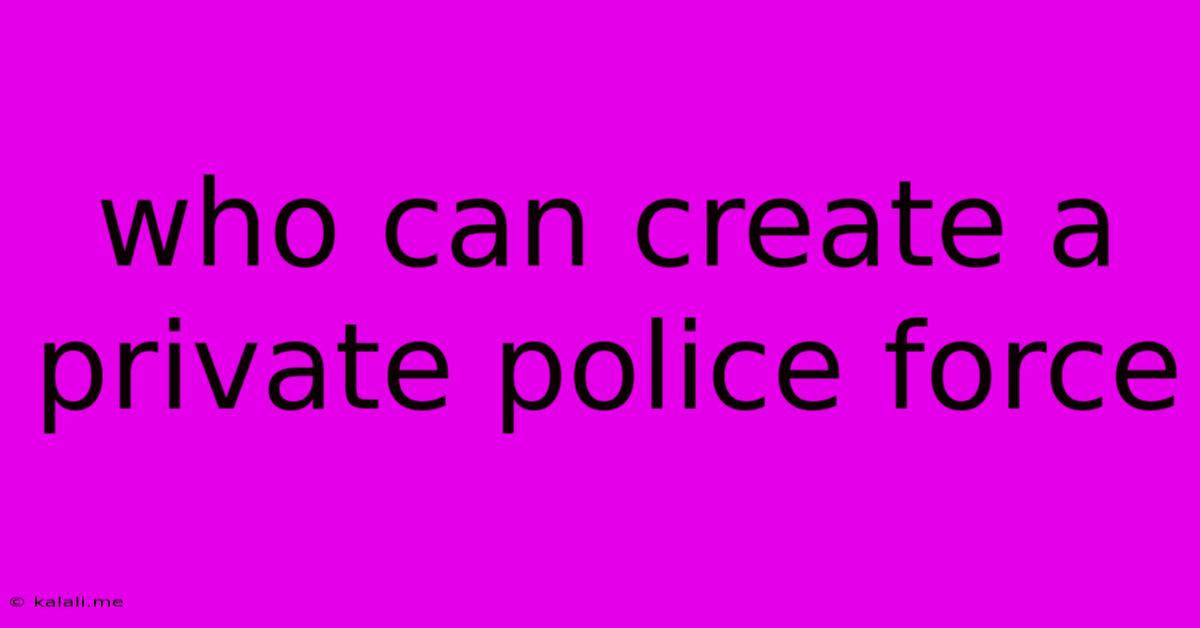Who Can Create A Private Police Force
Kalali
Jun 09, 2025 · 3 min read

Table of Contents
Who Can Create a Private Police Force? The Complexities of Private Security
The idea of a private police force conjures up images from dystopian fiction, but the reality is far more nuanced. While the term "private police force" might be misleading, the question of who can establish and operate significant private security operations with substantial powers is complex and varies greatly depending on jurisdiction. This article explores the legal and practical considerations surrounding the creation and operation of large-scale private security entities.
The Myth of the Private Police Force: It's crucial to understand that true "private police forces" with the same powers as state-sponsored law enforcement agencies are exceedingly rare and usually illegal. Governments maintain a monopoly on the legitimate use of force, a principle fundamental to the rule of law. This prevents the potential for competing power structures and ensures accountability.
Who Can Establish Significant Private Security Operations?
The legal landscape differs significantly across countries and even within different states or provinces. However, several key players often operate substantial private security operations:
-
Private Security Companies: These are the most common form of private security. They offer a range of services, from guarding property to providing security personnel for events. Their powers are strictly limited by law and they cannot generally arrest, detain, or conduct investigations like the police. The extent of their permissible actions depends heavily on local regulations and licensing. These companies typically operate under strict guidelines regarding training, licensing, and liability. Their scope is primarily focused on preventative measures and reporting incidents to the relevant authorities.
-
Corporate Security Departments: Large corporations, particularly those in high-risk industries (like finance or energy), often maintain their own internal security departments. These departments typically focus on protecting company assets and personnel. Like private security companies, their power is limited, and they are typically subject to the same legal restrictions. Their activities are generally confined to corporate property and related concerns.
-
Specialized Security Contractors: These contractors often provide security services to governments or international organizations in conflict zones or areas with unstable security situations. Their operations are often subject to specific contracts and international law, and their powers are usually defined within those agreements. They are often highly trained and equipped but still operate under strict limitations concerning their mandate.
Legal and Ethical Considerations:
The creation and operation of even large-scale private security operations are subject to strict regulations, including:
- Licensing and Registration: Most jurisdictions require private security companies and personnel to be licensed and registered. This ensures a level of oversight and accountability.
- Training and Standards: Minimum training standards are often mandated to ensure competence and professionalism within the industry.
- Liability and Insurance: Private security companies must typically carry liability insurance to cover potential damages or injuries caused by their personnel.
- Use of Force: Strict regulations govern the use of force by private security personnel. Their power to use force is typically limited to self-defense or the defense of others.
- Data Privacy and Surveillance: The collection and use of personal data by private security firms are usually subject to stringent privacy laws. Surveillance activities must typically comply with legal and ethical guidelines.
Conclusion:
While the notion of a private police force capable of operating independently with broad police powers is generally illegal and impractical, substantial private security operations exist and play a crucial role in various sectors. Their activities, however, remain strictly regulated and limited by law, ensuring a balance between private security needs and maintaining the state's monopoly on the legitimate use of force. The specific regulations vary widely, so anyone considering establishing a significant private security operation must familiarize themselves with the applicable laws and regulations in their specific jurisdiction.
Latest Posts
Latest Posts
-
How Many Cups Is 12 Oz Of Chocolate Chips
Jul 01, 2025
-
How Do You Beat Level 7 On Bloxorz
Jul 01, 2025
-
What Grade Level Do You Learn Algebra 1
Jul 01, 2025
-
How Long Ago Was The 16th Century
Jul 01, 2025
-
How Many Inches Are In 4 Yards
Jul 01, 2025
Related Post
Thank you for visiting our website which covers about Who Can Create A Private Police Force . We hope the information provided has been useful to you. Feel free to contact us if you have any questions or need further assistance. See you next time and don't miss to bookmark.